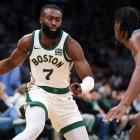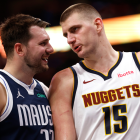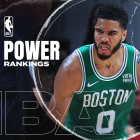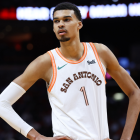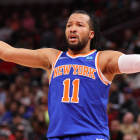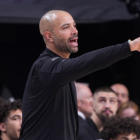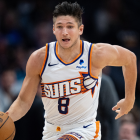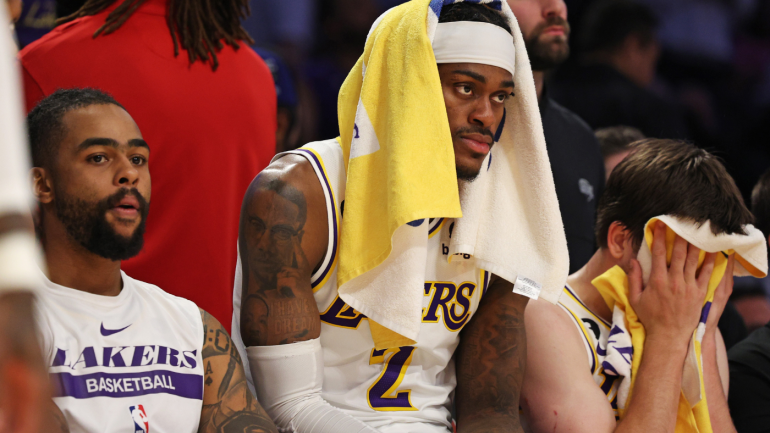
The Los Angeles Lakers can pretty cleanly divide their season into two halves: before the Russell Westbrook trade and after it. The pre-trade Lakers were a 25-30 team teetering on the brink of the lottery. The post-trade Lakers are a 27-16 team that is currently playing the Western Conference finals. The difference is nearly unfathomable, and the results ultimately justify the decision, championship or no. Ask Joel Embiid how hard it is to reach the conference finals. This Lakers season was a success largely because of that single transaction.
That deal sent Westbrook out and brought in D'Angelo Russell, Malik Beasley and Jarred Vanderbilt. For three months, the trio were fan favorites at Los Angeles. Russell swung the Memphis series with his 3-point shooting in Game 4. Vanderbilt's defense on Ja Morant and later Stephen Curry was essential. Beasley helped keep the offense afloat when LeBron James was hurt in March and April. The starting lineup featuring Vanderbilt, Russell, James, Anthony Davis and Austin Reaves outscored its opponents by 37 points in 77 minutes. In one move, the Lakers seemingly managed build an entire supporting cast around their superstar duo.
That supporting cast has largely been absent from the Western Conference finals. Vanderbilt has played 41 total minutes across the three Laker losses. Beasley hasn't even seen the court outside of garbage time. And Russell? He's now shooting 8-of-27 for the series. The Lakers have lost the minutes he has played by 53 points and won the minutes he's spent on the bench by 31 points.
This Lakers season was defined by the Westbrook trade, and yet it was the players who weren't involved in it that have largely carried them throughout this postseason. Nearly 82 percent of all Laker points in the Denver series (276 out of 337) have been scored by just four players: LeBron James, Anthony Davis, Austin Reaves and Rui Hachimura. Three of those players have been around since opening night. The fourth was acquired for scraps in January. The two other players getting consistent minutes in this series, Dennis Schroder and Lonnie Walker, were added in the offseason.
There's quite a bit of irony in all of that. The Lakers may have already had most of the championship supporting cast they needed even before trading Westbrook ... yet they still needed to trade Westbrook for it to emerge. This is especially true of Austin Reaves, who spent most of his shared Westbrook minutes languishing off of the ball but who has emerged as this team's point guard of the future since the trade. He closed the regular season averaging 16.5 points and five assists per game post-trade. He's been even better in the postseason. Schroder and Walker have benefitted for the same reasons.
But championship supporting casts need more than ball-handlers. More than anything, they rely on role players that can credibly contribute on both ends of the floor. This was the downside of the Westbrook trade. The Lakers turned one undeniable negative into three potentially positive players. Those positives shined for most of the post-trade portion of the season. But just as the regular season and the early rounds are defined by strengths, the late stages of the postseason are defined by weaknesses. The Lakers know this well from having played Westbrook in the postseason. They refused to guard him on the perimeter in five easy games in the 2020 bubble.
Yet they ultimately used his contract to trade for three players with very easily definable weaknesses. Beasley and Russell can't defend. Vanderbilt can't score. They are not two-way players. In this series, they largely haven't even been one-way players. Russell, who has struggled in the playoffs throughout his career, can't make a shot and is creating next to nothing for his teammates. Vanderbilt is getting screened off of Jamal Murray frequently, and it's allowing Murray to torture the overwhelmed Russell on the other end of the floor. Beasley needs to make 40 percent of his 3-pointers to justify any minutes given his defensive weaknesses. He hasn't come close since arriving in Los Angeles.
From that perspective, the Lakers swapped one, high-maintenance Westbrook for three more tolerable ones. True, Westbrook's absence itself had a positive impact on the roster, but it was ultimately his glaring weaknesses that made him such a poor fit for the Lakers. Vanderbilt, Beasley and Russell have all brought similar weaknesses to the table.
That doesn't make the trade a failure. Removing Westbrook in and of itself was a victory. But considering how close the Lakers have come to reaching the Finals, it's hard not to wonder whether there were more complete players on the market they could have traded for instead. We know of at least three.
The Lakers and Pacers spent months discussing a deal involving Myles Turner and Buddy Hield. Such a trade would have removed Westbrook from the Laker roster before the season, but it would have cost two unprotected first-round picks. The Lakers ultimately dealt one protected one to Utah. Turner is the definition of a two-way player, one of the NBA's best rim-protectors and a high-end 3-point shooter that could have functioned comfortably alongside Davis offensively. Hield is as vulnerable defensively as Russell or Beasley, but far harder to play off of the floor given the nature of his offense. He's such a reliable shooter and such a dangerous off-ball mover that he'd warrant significant defensive attention no matter what.
Then there's the other Hall of Fame point guard who was involved in the Westbrook trade. The Lakers could have simply taken Mike Conley Jr. for themselves. Instead they shipped him to Minnesota. The logic was sensible. Russell is far younger and could be a core piece for years to come. But Conley has a far better playoff track record. Even in his mid-30s he can survive defensively. He was an offensive menace for the Timberwolves in the playoffs, sinking six of his eight 3-point attempts against the Lakers in the play-in round before posting a relatively strong series against Denver. He would have provided a degree of offensive stability that Russell has lacked.
It's not even fair to call hindsight 20-20 in this perspective. Inserting Turner, Hield or Conley into this series changes the complexion of the matchup so significantly that the basketball itself would be unrecognizable. We can't even say for certain that the Lakers would have reached this stage against the Nuggets without the players they ultimately acquired. If Russell doesn't sink three enormous 3-pointers in the fourth quarter of Game 4 against the Grizzlies, the Lakers likely get eliminated in the first round. Heck, Russell, Vanderbilt and Beasley were essential to the Lakers even reaching the play-in round.
You can't win in the playoffs without reaching the playoffs. It's a balance the Lakers have now spent three years trying to strike. As James and Davis continue to get older and miss more time, the Lakers need players whose strengths can keep them afloat from October through April. Yet those same players struggle in May and June for many of the season reasons Westbrook always has. It puts Rob Pelinka in a nearly impossible position. For the Lakers to credibly compete for championships, he essentially needs to build two different rosters: one designed to maximize the strengths of one set of players just to survive the regular season and another devoid of the weaknesses that doom team in the postseason.
If that sounds almost impossible, well, it should. There's a reason only one team gets to win the championship every year. Pelinka dug himself an enormous hole by trading for Westbrook in the first place. That he nearly climbed out of it at all says quite a bit about the team he wound up building. Yet if the Lakers lose one more game to a team that has already beaten them three times in a row, the second half of the season will end where the first began: with a team besides the Lakers as the NBA champion. As impossible as it might have seemed when this team was 25-30, banner No. 18 was and will remain the goal for this group. By that standard, the Westbrook trade Pelinka made in February came up short. If he's going to correct that next spring, he's going to have to find a way to add players that lack the debilitating weaknesses they've seen firsthand out of Westbrook, Russell, Vanderbilt and Beasley.














